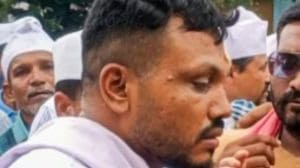The curious case of Dr Chishti
As the family of 77-year-old Mohammad Khalil Chishti,a microbiologist from Pakistan currently lodged in Ajmer Central Jail,waits for his release,Vijaita Singh meets his family and pieces together his story. Photographs by Oinam Anand.
Dr Mohammad Khalil Chishti has seen his children grow up only in photographs. In the nineteen years that Chishti,a microbiologist from Pakistan,has spent in India,he has missed out on all family milestones. He has missed the birthdays of his childrenfive daughters and a sonhe has missed the weddings of his two daughters and he has missed the birth of his grandchildren.
When his daughter Amna got married in 2007,he so badly wanted to be a part of the celebrations that he later got his photograph superimposed on her wedding photograph. That photograph is the first thing he turns to every morning,a picture that reminds him of the life he left behind so many years ago.
The second among three siblings,Chishti was born in Ajmer and later went to study in Karachi in 1946. A year later,Partition happened and Chishti stayed back,becoming a Pakistani citizen. While the eldest brother also moved to Pakistan,the youngest,Zameel,stayed back in India with their mother.
Meanwhile,Chishti went on to teach at Karachi College and earned a doctorate for his research in microbiology from Edinburgh University. He later moved to Saudi Arabia,where he was appointed director of the Al Riyadh International Airport that was under construction. During his stint in Saudi Arabia,he also headed the Haj Epidemiological Studies Centre.
While in Riyadh,he thought he would help his folks in India get jobs in Saudi. Many from the family went to Saudi on his invitation and got jobs and a better life there. But later,there was some change in the governments policy and many of them had to come back, says his nephew Yaseer Chishti.
Idris Chishti,a relative of Chishtis whom he had helped get a job in Riyadh,was among those who lost their jobs. And Idris held Chishti responsible. The shadow of Riyadh followed Chishti to Ajmer when he came calling on his ailing mother in 1992,who lived here with his brother Zameel. It was during that trip that he was accused of murdering Idris.
He (Chishti) came to see our mother and stayed back for a wedding at the house of one of our relatives. He was 58 then and was planning for his retirement. He wanted to live with his family in Karachi. Though the police FIR named him as the main accused,the reality is that he was in one of the rooms on the terrace when the fight broke out. He was punished simply because he is a Pakistani, says his brother Zameel.
That day,the fight had broken out over a trivial issue. You know what started it? A walking stick. Someone in Idriss family fell over chachas (Chishtis) walking stick at a wedding function. This was the immediate trigger but the real issue was that Idris had lost his job in Saudi Arabia and blamed chacha for it. We knew something could go wrong so we called the police and two constables were posted at our house. Despite this,a mob came to our house in the evening and started misbehaving with the women and beating up the men. Some men from our side also retaliated and several others were injured too. Even chacha was hurt and the police say he opened fire and the bullet hit Idris,killing him. How can an injured man open fire, asks Yaseer.
Yaseer claims that Chishti was innocent and it was in fact hima juvenile thenwho fired the gun. I was a juvenile then so they could not make me an accused. Since chacha jaan is a Pakistani,they found him an easy target. Even I was detained but I was released, he says.
Chishti was arrested after the murder but was released on bail. He was shifted to his brothers farmhouse at Hatundi,12 kilometres from Ajmer,where he lived under house arrest,reporting to the local police station every 15 days.
He made so many entries at the local police station in the past 19 years that they can be compiled into a book, says Yaseer.
Living alone in the farmhouse away from his family in Pakistan,Chishti filled in the hours writing poems and translating Arabic scriptures into English. Diwan Hazrat Ali,a religious text,is one of the books Chishti translated into English. He also kept a diary.
There are more than 100 diaries that contain his personal notings, says Yaseer. From describing the weather to writing about his love for animals,the diaries are chronicles of his days in confinement.
Life would have gone on in this vein had it not been for the intervention of his daughter Amna. Last year,Amna,a Toronto-based social worker,wrote to the President of India,the Law Minister and the Chief Justice of India,seeking a speedy trial of her fathers case.
The Law Ministry took up the matter and directed the Jaipur High Court to look into the case who asked the sessions court in Ajmer to fast-track it. It was heard on a day-to-day basis and the verdict was announced on January 31,2011. Chishti was declared guilty along with four others. He was then put in jail, says Zameel.
After the verdict was announced,Chishtis family moved the Jaipur High Court for bail but it was rejected on grounds that he had not spent enough time in jail.
Meanwhile,several NGOs started a campaign seeking Chishtis release,pleading he was old and ill and had already spent many years away from home. He cannot harm anyone. He is an old man and we have been fighting for his release. We have roped in several human rights organisations to be part of our campaign to release Chishti, says Anand Bhatnagar,an activist of the Peoples Union for Civil Liberties,one of the groups campaigning for his release.
The case recently caught the attention of Supreme Court judge Markandey Katju who wrote a letter to Prime Minister Manmohan Singh,seeking a pardon for Chishti on humanitarian grounds. The 77-year-old suffers from a host of health problems,including a cardiac condition and a fractured hip bone.
After Chishtis case caught the attention of Justice Katju,the matter was brought to the notice of Rajasthan Chief Minister Ashok Gehlot. Though Gehlot has cleared the mercy petition,governor Shivraj Patil is yet to decide on the issue.
The Chief Ministers office had asked us for a report on the case. We sent a detailed report along with the background of the case. We are yet to hear anything about his release, says Manju Rajpal,district collector,Ajmer.
Meanwhile,Prime Minister Manmohan Singh has forwarded Justice Katjus letter to Home Minister P Chidambaram,asking him to examine if Chishti could be considered for a pardon on humanitarian grounds.
On Wednesday,jail authorities took Chishti to the JLN Hospital in Ajmer for a medical examination. A panel will decide on his condition. Based on this report,anything could be decided on his mercy petition, says Omendra Bhardwaj,director general,Rajasthan Prisons. There are ten other prisoners above the age of 70 lodged in Ajmer Central Jail.
Recently,Chishtis family in Pakistan too moved the Supreme Court in that country seeking the courts intervention to get him released. On Thursday,during her visit to Pakistan,foreign secretary Nirupama Rao said she was hopeful that the case would be resolved soon.
His relatives say his wife,Mehrunissa,who is now hearing impaired,wants to see her husband before she dies. She has many health problems. The couple wants to spend the remaining days of their life together. He is an educated and learned man,he cannot harm anyone, says another of Chishtis nephews,Farookh.
He saw his grandchildren grow up in photographs. He yearns to see them. Though we are also his family,his children and wife are back home in Pakistan. That is where he belongs, says his brother Zameel.
Case File
February 1992: Dr Mohammad Khalil Chishti,a Pakistani microbiologist,comes to Ajmer to see his ailing mother
February 14: Chishti goes to attend a wedding in the neighbourhood and gets into an argument with a relative,Idris Chishti,and some others. The same evening,a mob,including Idris,comes to Chishtis brothers house and a scuffle breaks out between the two groups. Police say Chishti opened fire and killed Idris. Chishti and four others arrested
March 1992: Chishti is released on bail. He is shifted to his brothers farmhouse at Hatundi,12 km from Ajmer. He lives there under house arrest and is required to mark his presence at the local police station every fifteen days
2010: His daughter Amna,who lives in Toronto,writes several letters to the President of India and the Law Ministry,asking for a speedy trial. The case is fast trackedthe Jaipur High Court asks the sessions court in Ajmer to hear the case on a daily basis
January 31,2011: The verdict is announced. Chishti and four others are declared guilty
February 2011: Chishti is put in Ajmer Central Jail
March 2011: A campaign for Chishtis release gathers momentum. The case catches the attention of Supreme Court judge Markandey Katju who writes to Prime Minister Manmohan Singh to seek his intervention to release Chishti on humanitarian grounds
April 26: The District Collector sends a detailed report to Rajasthan CM Ashok Gehlot
June 18: Rajasthan Chief Minister Ashok Gehlot clears Chishtis mercy petition
June 20: Prime Minister Manmohan Singh asks Home Minister P Chidambaram to examine if the request of Justice Markandey Katju for pardon to Chishti could be considered on humanitarian grounds
June 22: A medical board examines Chishti
June 23: Foreign secretary Nirupama Rao says in Pakistan that the case likely to be resolved soon
The victim
Idris Chishti,who was allegedly killed by Dr Khalil Chishti,was 40 when he died. A relative of Chishtis brothers wife,Idris was one of the people from Ajmer for whom Chishti had secured jobs at the Al Riyadh International Airport where he was director. But Idris lost his job and held Chishti responsible for his sacking.
In 1992,when Chishti came to visit his ailing mother in Ajmer,a scuffle broke out at a neighbours house with members of Idriss family after one of them stumbled over his walking stick. A few hours later,Idris and a group of men went to Chishtis brothers house and a fight broke out between them. A gun shot killed Idris. Chishti and four others were arrested for his murder.



- 01
- 02
- 03
- 04
- 05




























